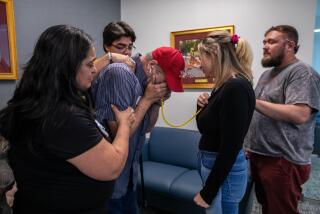HIV Tests Sought for Organ Transplants
WASHINGTON — To prevent the transmission of AIDS through organ transplants, the Bush Administration proposed a new rule Friday to require testing of organs and tissue before delivery to hospitals to ensure they are not contaminated by the human immunodeficiency virus.
HIV screening of transplanted organs already is required by National Organ Procurement and Transplantation Network, to which all procurement organizations must belong, and the proposed regulation would simply give that policy the force of law. Officials with the network said that all organ procurement organizations currently test for the HIV virus, which causes AIDS.
“Everybody in the health care field must recognize the need to employ every possible safeguard to protect the patients under our care from infection by the deadly AIDS virus,” said Health and Human Services Secretary Louis W. Sullivan, who issued the draft regulation. “Ensuring the quality of organs for transplantation is one important step we can take with available technology.”
Concern about organ transplants was raised last month by the disclosure that three people had died after receiving transplants from an infected donor in 1985. Three other recipients have tested positive for HIV infection, and the Virginia hospital where the transplants took place has tested 40 other recipients with results still undetermined.
The draft regulation establishes new requirements that organ procurement organizations must meet in order to receive payments from Medicare and Medicaid. Gail R. Wilensky, administrator of the Health Care Financing Administration, said that any organization that failed to meet the requirements could be expelled from the Medicare and Medicaid programs and could forfeit its designated service area to another organ supplier.
Wilensky said that the regulation would ensure the safety of transplants for all patients, not just Medicare and Medicaid recipients, because the same organizations are the source of all transplanted organs.
The regulation, which will take effect within 90 days, will require that the service areas of such organizations be “of sufficient size to ensure maximum effectiveness in the procurement and equitable distribution of organs.”
More to Read
Sign up for Essential California
The most important California stories and recommendations in your inbox every morning.
You may occasionally receive promotional content from the Los Angeles Times.










